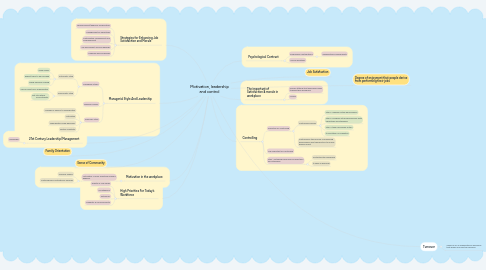
1. 21st Century Leadership/Management
1.1. Leadership
2. Sense of Community
3. Family Orientation
4. Motivation in the workplace
4.1. Motivation- Forces Affecting People’s Behavior
4.1.1. Classical Theory
4.1.2. Contemporary Motivational Theories
5. Strategies for Enhancing Job Satisfaction and Morale
5.1. Reinforcement/behavior modification
5.2. Management by objectives
5.3. Participative management and empowerment
5.4. Job enrichment and job redesign
5.5. Modified work schedules
6. Managerial Style And Leadership
6.1. Managerial Styles
6.1.1. Autocratic Style
6.1.1.1. Issue orders
6.1.1.2. Expect them to be followed
6.1.1.3. Rapid decision-making
6.1.2. Democratic Style
6.1.2.1. Ask for input from subordinates
6.1.2.2. But still retains final authority
6.2. Behavior Theory
6.3. Free-Rein Style
6.3.1. Manager is advisor to subordinates
6.3.2. Motivation
6.3.3. Subordinates make decisions
6.3.4. Fosters creativity
7. High Priorities For Today’s Workforce
7.1. Quality of Life Issues
7.2. Volunteerism
7.3. Autonomy
7.4. Flexibility & Nonconformity
8. Job Satisfaction
9. Degree of enjoyment that people derive from performing their jobs
10. Turnover
10.1. Annual % of an organization’s workforce that leaves and must be replaced
11. Psychological Contract
11.1. Employee’s Contributions
11.1.1. Organization’s Inducements
11.2. Human Relations
12. The important of Satisfaction & morale in workplace
12.1. Overall attitude that employees have towards their workplace
12.2. Morale
13. Controlling
13.1. Definition of Controlling
13.1.1. Controlling Process
13.1.1.1. step 2: measure actual performance
13.1.1.2. step 3: compare actual performance with objectives and standards
13.1.1.3. step 4: take neccessary action
13.1.1.4. It facilitates co-ordination
13.1.2. Controlling is the process of measuring performance and taking action to ensure desired result.
13.2. The Important of Controlling
13.3. step 1: Establish performance objectives and standards
13.3.1. Protecting the workplace
13.3.2. It helps in planning
